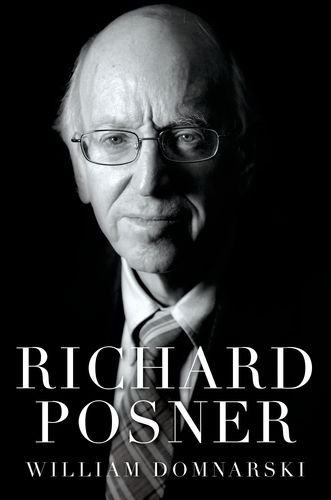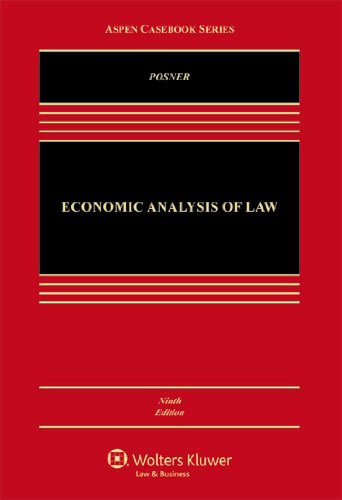Reflections on Judging. By Richard A. Posner. Harvard University Press 2013. ISBN: 0674725085, 9780674725089
购买本书@亚马逊
 In Reflections on Judging, Richard Posner distills the experience of his thirty-one years as a judge of the United States Court of Appeals for the Seventh Circuit. Surveying how the judiciary has changed since his 1981 appointment, he engages the issues at stake today, suggesting how lawyers should argue cases and judges decide them, how trials can be improved, and, most urgently, how to cope with the dizzying pace of technological advance that makes litigation ever more challenging to judges and lawyers.
In Reflections on Judging, Richard Posner distills the experience of his thirty-one years as a judge of the United States Court of Appeals for the Seventh Circuit. Surveying how the judiciary has changed since his 1981 appointment, he engages the issues at stake today, suggesting how lawyers should argue cases and judges decide them, how trials can be improved, and, most urgently, how to cope with the dizzying pace of technological advance that makes litigation ever more challenging to judges and lawyers.
For Posner, legal formalism presents one of the main obstacles to tackling these problems. Formalist judges—most notably Justice Antonin Scalia—needlessly complicate the legal process by advocating “canons of constructions” (principles for interpreting statutes and the Constitution) that are confusing and self-contradictory. Posner calls instead for a renewed commitment to legal realism, whereby a good judge gathers facts, carefully considers context, and comes to a sensible conclusion that avoids inflicting collateral damage on other areas of the law. This, Posner believes, was the approach of the jurists he most admires and seeks to emulate: Oliver Wendell Holmes, Louis Brandeis, Benjamin Cardozo, Learned Hand, Robert Jackson, and Henry Friendly, and it is an approach that can best resolve our twenty-first-century legal disputes.
Review
“A deep and thought-provoking collection of insightful analyses of various aspects of being a judge, told from an insider’s perspective, but with appropriate and equally thoughtful caveats about the advantages and disadvantages of an insider’s account.”—Frederick Schauer, University of Virginia School of Law
Table of Contents
Introduction: A Judge on the Challenges to Judges
Two Kinds of Complexity
Extrajudicial Writing by Judges
Plan of the Book
Appendix: External versus Internal Complexity in Federal Adjudication
1. The Road to 219 South Dearborn Street
Education and Early Career
The Federal Judicial Appointment Process in 1981
Transition, and the Question of Initial Judicial Training
2. The Federal Judiciary Evolves
A Half-Century of Change
Input-Output, with Special Reference to the Supreme Court
Staff and Specialization in Relation to Rank
3. The Challenge of Complexity
Complexity Further Explained
Examples, Primarily from Criminal Law and Sentencing
The Impact of Technology
Judicial Insouciance about the Real
Specialization the Solution?
Internal Complexity: The Case of the Bluebook
4. Formalism and Realism in Appellate Decision Making
The Formalist Judge
The Realist Judge
Advice to New Appellate Judges
5. The Inadequate Appellate Record
Internet Research by Judges
Is a Word Really Worth a Thousand Pictures?
6. Coping Strategies for Appellate Judges I: Judicial Self-Restraint
Thayer and His Epigones
The Decline of Self-Restraint
The Rise of Constitutional Theory
Thayerism’s Death and Legacy
7. Coping Strategies for Appellate Judges II: Interpretation
The Spirit Killeth, but the Letter Giveth Life
Dreaming a Constitution
Opposites Attract and Repel
Realist Interpretation
8. Make It Simple, Make It New: Opinion Writing and Appellate Advocacy
The Signs of Bad Judicial Writing
The Writer Model versus the Manager Model
Management versus Managerialism
The Formalist Opinion
Rules of Good Opinion Writing
The Morris Opinion
Some Tips on Appellate Advocacy
Appendix: United States v. Morris (Original and Rewritten)
9. Forays into the District Court
Expert Witnesses and Trial by Jury: An Anecdotal Introduction
Party-Appointed and Court-Appointed Expert Witnesses
The Jury
Jury Trials in Patent Cases
Internet Research by Jurors
Other Issues
Appendix: Jury Instructions in Chamberlain v. Lear
10. What Can Be Done, Modestly?
Staffing
Initial Judicial Training
Continuing Judicial Education
The Widening Gap between Academia and the Judiciary
The Role of the Law Schools in Continuing Judicial Education
MOOCs to the Rescue?
Conclusion: Realism, the Path Forward
Acknowledgments
Index
Richard A. Posner is Circuit Judge, the United States Court of Appeals for the Seventh Circuit, and a senior lecturer at the University of Chicago Law School.
 No sitting federal judge has ever written so trenchant a critique of the federal judiciary as Richard A. Posner does in this, his most confrontational book. Skewering the politicization of the Supreme Court, the mismanagement of judicial staff, the overly complex system of appeals, the threat of originalism, outdated procedures, and the backward-looking traditions of law schools and the American judicial system, Posner has written a cri de coeur and a battle cry. With the prospect that the Supreme Court will soon be remade in substantial, potentially revanchist, ways, The Federal Judiciary exposes the American legal system’s most troubling failures in order to instigate much-needed reforms.
No sitting federal judge has ever written so trenchant a critique of the federal judiciary as Richard A. Posner does in this, his most confrontational book. Skewering the politicization of the Supreme Court, the mismanagement of judicial staff, the overly complex system of appeals, the threat of originalism, outdated procedures, and the backward-looking traditions of law schools and the American judicial system, Posner has written a cri de coeur and a battle cry. With the prospect that the Supreme Court will soon be remade in substantial, potentially revanchist, ways, The Federal Judiciary exposes the American legal system’s most troubling failures in order to instigate much-needed reforms.







